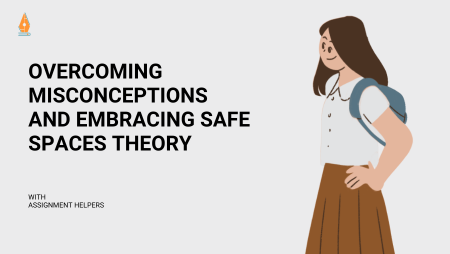The Challenge of Studying Abroad
Studying abroad is a fantastic way for students to meet new people, experience other cultures, and broaden their worldview. However, assignment helpers experts state that false beliefs about “safe spaces” may hinder kids’ ability to adjust to new situations. In this blog, we’ll discuss common misconceptions regarding safe spaces, especially for international students, and offer doable tactics for succeeding in these environments with assignment aids.
What is the Safe Spaces Theory?
Following the publication of Greg Lukianoff and Jonathan Haidt’s essay, The Coddling of the American Mind (2015), the idea of safe places attracted further attention. According to them, safe spaces are places where pupils are shielded from concepts and language that can be upsetting. Although the goal is to foster inclusivity, there are worries that this protected cocoon may impede progress.
Misconceptions About Safe Spaces When Studying Abroad
Although safe spaces are more common on American campuses but rare worldwide, many international universities prioritize encouraging resilience and critical thinking even when they push students beyond their comfort zones. When students first start studying abroad, they could believe the following myths:
Misconception: There Are Safe Places All Around Us
Contrary to popular belief, there is no need for specific safe spaces at many international colleges, as open discourse and debate are encouraged. This exposure helps students gain resilience and learn how to negotiate various points of view.
Misconception: Getting Accustomed to a New Culture Involves Total Conformity
Students can retain their identity when fully adjusting to new cultural standards. It’s essential to maintain moral integrity while acknowledging cultural quirks.
Misconception: Academic Challenges Will Be the Same as Back Home
Significant differences in academic standards and instructional methods may exist. Pupils must be ready for a different kind of educational experience, and assignment helpers could be necessary to help them make the transition.
Safe Spaces Abroad: What to Expect
The educational environment may not offer the same “safety nets” as those found in American institutions in Europe and other parts of the world. Instead, students are urged to welcome discomfort as a necessary component of their intellectual and psychological development. The Americanized definition of safe spaces might work better in other countries where adaptability and resilience are valued. Students can do the following to succeed in these kinds of settings:
Acknowledge Everyone You Meet
Simple gestures of civility go a long way when residing overseas. Recognize everyone you come into contact with, from your neighbors to the grocery store cashier. Creating ties early on will help to smooth the transition and increase your sense of belonging. Remember that first impressions count, and respecting the local way of life, even with rudimentary language skills, can make all the difference in the world. This is one of the most important point by assignment helpers.

Embrace Cultural Differences with a Chameleon Mindset
Being an outsider and making a name for yourself while studying abroad is one of the hardest things. But embrace the distinctions rather than fighting against them. Take note of how individuals behave, dress, and speak in social situations and adjust your behavior accordingly. Maintaining your moral compass and living like a local will ease the transition.
Utilize Assignment Helpers for Academic Success
The strain of academics can be too much to handle, mainly when one is in a foreign setting with different expectations and norms. As you adjust to your new environment and complete your coursework on time, assignment helpers can be your saving grace. You may maintain strong study habits and concentrate on acclimating to your new life abroad by taking help from assignment helpers, whether you need assistance with essays, research, or complicated assignments.
Participate in Campus Events and Networks
You can quicken your adjustment by taking the initiative and participating in study groups, student organizations, and neighborhood activities. These events allow you to network with like-minded people, form friendships, and create a support system. Assignment helpers state that a strong network can be an unofficial “safe space” to discuss difficulties, exchange experiences, and get encouragement.
Adapt to Different Teaching Styles and Expectations
The academic culture may be different from your own. For instance, although some universities emphasize individual study, others could be more interested in group projects and conversations. Navigating these disparities requires you to be adaptable and open-minded. Assignment helpers can be beneficial as they provide individualized advice to help you do well and achieve academic requirements.
Give your mental and emotional health priority
Safe spaces may not be as well-known, but giving your mental health first priority is still essential. Ensure you can get counseling and maintain contact with your friends and relatives back home. Assignment helpers also suggests that in order to stay mentally stable while traveling, continue with consistent exercise, a balanced diet, and enough sleep.
Leverage Online Learning Resources
Access to online learning environments, virtual study groups, and assignment helpers can close the comprehension gap on complex subjects. These materials are quite helpful when there is a lack of typical classroom support. Regardless of where you are, staying involved in online or offline educational groups can help you stay grounded and achieve academic success.
Studying overseas broadens your horizons and forces you to step outside your comfort zone. It is a rewarding experience. Safe areas provide security, but actual growth comes from embracing the obstacles you face. Any academic environment, even far from home, can thrive if you have the correct attitude, have assignment helpers to help you, and when you are prepared to adjust. Remember that real growth occurs when you move outside of your comfort zone.


